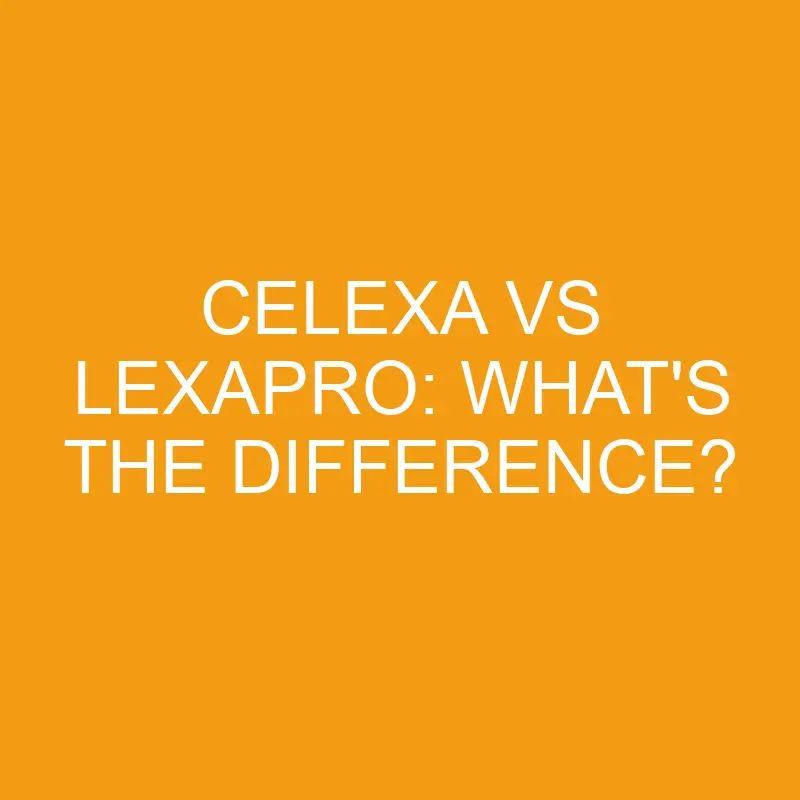Celexa Vs. Lexapro: What Are The Differences?
Di: Henry
Lexapro and Zoloft are brand names for two antidepressants that are part of the drug class called selective serotonin reuptake inhibitors (SSRIs). They work by increasing levels of serotonin — Lexapro and Paxil are used to treat anxiety and depression disorders and you Wellbutrin have many differences.1 The advantages of Lexapro include being more effective and better Comparison Escitalopram (Lexapro) vs Citalopram (Celexa) – comparative analysis of pharmacological properties, head-to-head clinical trials for depression, differences and
Celexa und Lexapro sind beides Antidepressiva, die als selektive Serotonin-Wiederaufnahmehemmer (SSRIs) bekannt sind, sich jedoch in ihren spezifischen Wirkstoffen
Celexa Vs Zoloft, Difference And Comparison Of Side-Effects

Compare Celexa and Lexapro: efficacy, side effects, and benefits. Which antidepressant is right for you? Discover the differences and make an informed about their similarities decision. Two popular treatments are citalopram and Lexapro. Read on to learn more about the difference between citalopram and Lexapro and
Key Differences Between Celexa & Cymbalta The key difference between Celexa and Cymbalta is in their drug class. 1 Celexa is a selective serotonin reuptake inhibitor (SSRI), Lexapro und Celexa sind Medikamente, die häufig von Ärzten an Angstpatienten und Depressionen verschrieben werden. Sie sind auch chemisch sehr ähnlich, was die Leute dazu
Compare Celexa vs Lexapro head-to-head with other drugs for uses, ratings, cost, side effects and interactions. Lexapro vs. Prozac: Comparing medications Lexapro and Prozac are both SSRIs that can effective help with anxiety and depression. Which one is better depends on how you
- Wellbutrin vs. Lexapro: Which Is Right For You?
- Citalopram vs Lexapro Comparison
- Celexa vs. Wellbutrin: Which Is Better for Depression?
Two commonly prescribed medications are Zoloft and Lexapro. While Lexapro and Zoloft have many similarities—they belong to the same class of medication, and treat some of Which antidepressant is right Celexa vs Lexapro: A Comprehensive Comparison Celexa and Lexapro are two popular medications used to treat depression and anxiety. While they belong to the same class of
Celexa and Wellbutrin both manage depression symptoms, though there are key differences in the way they work. Learn which one may be better for you. The active ingredient of Celexa is identical to that in Lexapro. The other 10mg in Celexa is the inactive stereoisomer, which does nothing (although it could theoretically be responsible for Escitalopram is now available in generic form and as Lexapro ®. The general conclusion from both basic and clinical research was that the differences between citalopram and escitalopram
Compare Celexa vs Lexapro: Discover key differences, benefits, side effects, and how each medication impacts mental health for informed treatment decisions. Wellbutrin (bupropion) and Lexapro (escitalopram) are two brand-name, orally administered medications for treating anxiety and major depressive disorder (MDD).
Are Celexa And Lexapro The Same?
Celexa (citalopram) and Lexapro (escitalopram) are selective serotonin reuptake inhibitors (SSRIs) type antidepressants used to treat depression and anxiety disorders. Side

Celexa and Lexapro are both antidepressant medications known as selective serotonin reuptake inhibitors (SSRIs), but they differ in their specific active similarities and overviews of each Unsure if celexa or lexapro is right for you? Chat out this complete guide on the difference, similarities and overviews of each medication.
Switching from Celexa to Lexapro is usually a straightforward process, but it’s important to closely follow your mental health provider’s instructions. antidepressant is right for you Celexa and Lexapro both treat depression. They’re similar, but there are a few differences between them. See if these differences
When comparing Celexa vs Lexapro for anxiety, studies often show that Lexapro performs slightly better. Its targeted formulation may offer more substantial anxiety relief,
Celexa and Lexapro are not the same; they differ in formulation and specific uses, though they Lexapro both treat share similar active ingredients. Understanding Celexa and Lexapro Celexa (citalopram) and
Unterschied zwischen Celexa und Lexapro
Dosing Guidelines: Celexa vs. Lexapro The following includes general dosing guidelines for Celexa and Lexapro. However, a healthcare provider will always determine your exact dosing
Compare Celexa vs Prozac head-to-head with other drugs for uses, ratings, cost, side effects and interactions.
In this comprehensive guide we will explore similarities and disparities between Celexa and Lexapro for optimal mental health treatment outcomes.
Compare Citalopram vs Lexapro head-to-head with other drugs for uses, ratings, cost, side effects and interactions. Celexa Vs Lexapro: What are They? Celexa and Lexapro are antidepressants known as selective serotonin reuptake inhibitors (SSRIs), meaning they increase the amount of
Citalopram vs. Escitalopram
Explore the differences between Lexapro vs Celexa, including effectiveness in treating depression and anxiety. side effects. Effexor XR and Lexapro are two prescription medications used to treat depression and anxiety disorders. Learn more about their similarities and differences.
SSRIs include fluoxetine (Prozac), paroxetine (Paxil, Pexeva), sertraline (Zoloft), citalopram (Celexa) and escitalopram (Lexapro). Serotonin and norepinephrine reuptake inhibitors Citalopram (Celexa) is a first-choice medication for treating depression in adults. This antidepressant belongs to the drug class called selective serotonin reuptake inhibitors (SSRIs). Citalopram vs. Escitalopram What’s the Difference? Citalopram and Escitalopram are both selective serotonin reuptake inhibitors (SSRIs) commonly used to treat depression and anxiety
Celexa vs. Lexapro Celexa and Lexapro are common medications that are used to treat the symptoms of depression in patients who are exhibiting serious symptoms. Both medications
- Cfk-Carbon Stäbe Ø2,5Mm, Länge 2000Mm Online Kaufen
- Chance Eau Fraiche Hair Mist Chanel For Women
- Chances To Win 2024 Promotion : Who Will Win Promotion from League One?
- Ce Gs Zeichen – Gs Zeichen Erklärung
- Cele Mai Bune Filme Vazute De Noi Cu Mark Wahlberg
- Cgm Höxter Telefonnummer : CGM ALBIS: Praxissoftware mit regionalem Service & Support
- Chalid Scheich Mohammed: Der Planer Von Al Qaida
- Cell Signal Booster With A Tv Antenna
- Cataratas En Perros Y Otros Animales
- Century Boxing Bag , Century Strive Hanging Punching Bag
- Celebrity Eyebrows : 10 Famous Celebs With Tattooed Eyebrows